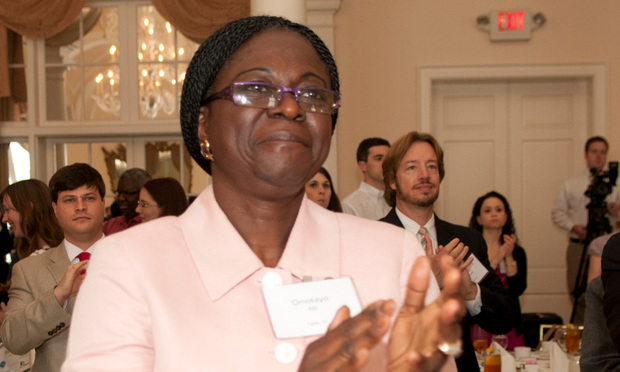After COVID-19 began spreading through the Fulton County Jail, the executive director of the Georgia Public Defender Council sent an urgent letter to Georgia’s criminal justice community March 27.
“A few local courts” across the state were still requiring public defenders to appear personally at county jails before their clients could be released or their cases could proceed, warned Executive Director Omotayo Alli. Requiring public defenders to make personal appearances at jails across the state “heightens the risk” for the transmission of COVID-19, she said.
The mandated appearances conflicted with a council directive instructing public defenders to use alternative means, including video and teleconferencing, to process their clients’ cases.
Alli urged the courts still requiring personal appearances—although she did not identify them in her letter—to implement alternatives “as soon as possible” to limit the risk to lawyers, clients, court officers and incarcerated defendants. She also asked judges who determined a public defender must be physically present to represent a client to contact the council or their circuit public defender in advance “so all parties may confer on appropriate precautions.”
“The threat presented by coronavirus is simply too great, both to individuals and to the overall justice system, to do otherwise,” Alli wrote.
Alli forwarded her letter to the leaders of the state judicial councils and other members of the criminal justice community March 27.
Alli said that by Monday, “technology-enabled solutions have now been fully implemented at the jail for all hearings without abridging the rights of defendants.” A “skeleton crew” of public defenders who maintained an office at the jail have been moved “out of an abundance of caution,” she said.
On March 27, five Fulton County jail inmates, all trustees, tested positive for the novel coronavirus, said Tracy Flanagan, a spokeswoman for Sheriff Ted Jackson. By Monday, the number of coronavirus cases nearly tripled, rising to 14, Flanagan confirmed. One has been released from custody and hospitalized, she said. The remaining 13 are housed together in a separate unit of the jail, she said. All were inmate trustees who, by virtue of their status, moved more freely around the jail, and whose chores Flanagan said included sanitation duties intended to mitigate or prevent the virus’ spread.
Flanagan said that staff members who were in close contact with the infected inmates have been asked to self-quarantine. But Flanagan said that first appearance hearings were still ongoing at the courtroom inside the county jail as late as March 27. Deputies were bringing 10 inmates at a time into the courtroom. She said the courtrooms were cleaned before a new group of inmates were brought in by the jail’s trustees. Among those trustees was at least one who has tested positive for the virus, she said.
Flanagan said that inmates also were still being transported to the Fulton County Courthouse for first appearances last week nearly two weeks after Harold Melton, chief justice of the Supreme Court of Georgia, declared a statewide judicial emergency March 14. On March 13, Fulton County Superior Court Chief Judge Christopher Brasher issued a countywide judicial emergency declaration drastically curtailing all but the most essential functions for Fulton County’s courts.
Fulton County Chief Magistrate Judge Cassandra Kirk said March 27 that the Fulton County district attorney’s staff and the county public defender’s office have begun reviewing lists of detainees to determine whether they could modify bonds and release them. Kirk said that county magistrates are asking local law enforcement officers to issue citations rather than seek arrest warrants for nonviolent offenses.
On Monday, Brasher said remote hearings began at the jail last week “and seemed to hold good promise.” The last transport of inmates from the jail to the county courthouse was March 26, he said. Only 60 inmates were brought to the courthouse last week, he added.
Brasher said that because of the COVID-19 jail cases, “Efforts are underway to cease all unnecessary movement of inmates within the jail for any needed hearings, including first appearance, bond hearings, and guilty pleas.”
Judges, prosecutors, defense attorneys, clerk staff and court reporters are now participating remotely via video conferencing, he said.
NOT FOR REPRINT
© 2024 ALM Global, LLC, All Rights Reserved. Request academic re-use from www.copyright.com. All other uses, submit a request to [email protected]. For more information visit Asset & Logo Licensing.


 Omotayo B. Alli is the executive director of the Georgia Public Defender Council. She is shown here in 2013, when she was with Fulton County Juvenile Court. (Photo: Rebecca Breyer)
Omotayo B. Alli is the executive director of the Georgia Public Defender Council. She is shown here in 2013, when she was with Fulton County Juvenile Court. (Photo: Rebecca Breyer)






